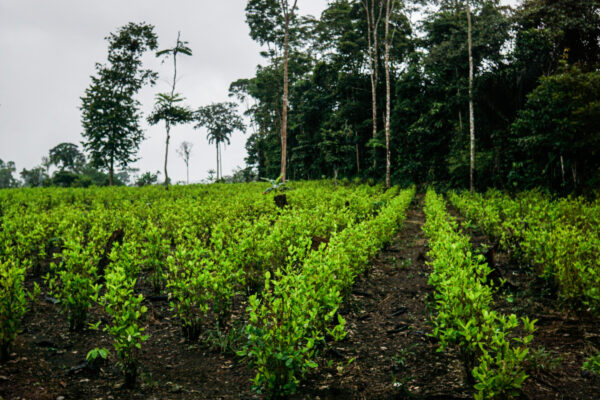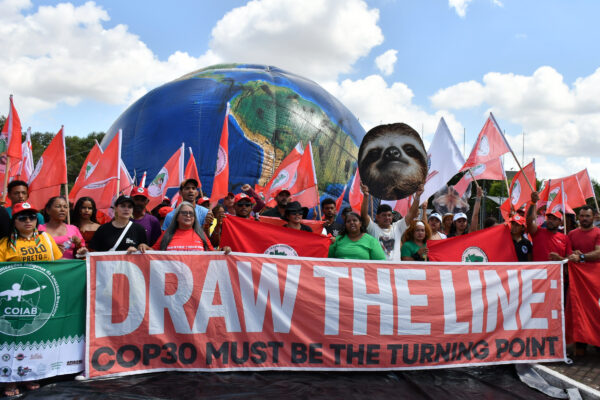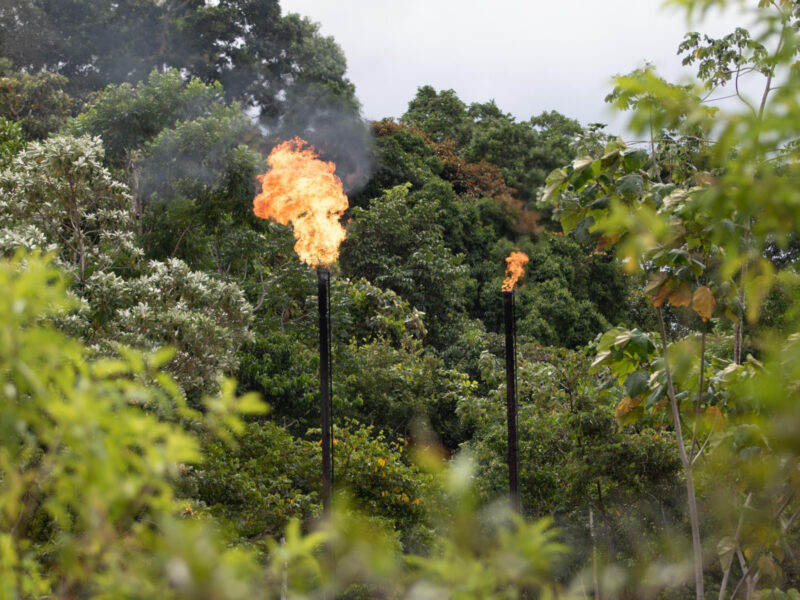***
Press conference at 9am on Wednesday, April 30 before Talisman Energy annual general meeting and another briefing immediately afterwards around 12:30pm at Calgary Convention Center, South Building, Room Glen 210 (immediately across walkway from Talisman AGM). Talisman AGM at 10:30am in the Calgary Convention Center, North Building, Exhibition Hall CDE.
***
Calgary, Alberta – A delegation of indigenous leaders from the Peruvian Amazon is in town this week to tell two Calgary oil companies that they oppose drilling on their tropical rainforest homelands.
The delegation, representing the Achuar people of northeastern Peru, will hold a private meeting on Tuesday with Talisman CEO and President John Manzoni and then attend the company’s annual general meeting for shareholders on Wednesday in downtown Calgary. The delegation has also requested a meeting with executives from PetrolÃfera, another local oil company, which also owns a hydrocarbon concession on Achuar land.
Talisman holds drilling rights to two concessions known as “Block 101” and “Block 64”. Occidental Petroleum (Oxy), the previous operator of Block 64, quit the concessions after strong opposition from local communities. Together, the concessions cover a total of four million acres of pristine tropical rainforest in the Pastaza and Morona River basins, inhabited by the Achuar since time immemorial.
PetrolÃfera now owns a concession known as “Block 106”, also on Achuar land, in the neighboring Corrientes River basin, where the local Achuar representative federation FECONACO is both opposed to oil exploitation and insists it has not been meaningfully consulted by either the company or the Peruvian government during the process of granting concessions on ancestral lands.
One federation, ATI, stated in a 2007 public communiqué regarding Talisman’s activities in Block 101: ” want to clearly say to them, as we have done in the past and as we will do in the future, the Achuar people won”t permit the arrival of any petroleum company because we don”t want to develop ourselves under the risks of this activity.’
The Achuar have a long and deeply disturbing history of exploitation at the hands of the oil industry. They are currently suing Oxy, which dumped a total of nine billion barrels of toxic wastewater directly into the rainforest in and around the Corrientes River, while it drilled for 30 years.
Even with modern technology and best industry practices, oil and gas drilling is likely to take a heavy toll on the Amazon rainforest and its waterways, and therefore on the indigenous people who have lived in harmony with them for millennia and who continue to depend on healthy plants and fish and game populations for their survival.
Talisman acquired full working interest in Block 101 in 2006 and increased its interests in Block 64 to 50 percent in 2007. The concessions also overlap the Pastaza alluvial fan, an enormous wetlands area, classified as a site of international importance under the RAMSAR Convention. Dozens of species of animals listed in the Convention on International Trade in Endangered Species are found in these wetlands, along with 17 species on the International Union of Concerned Scientists “Red List of Threatened Speciesâ€. The cumulative impact of oil activities in the coming years would likely contribute to some species’ extinction.
In particular, the roads necessitated by oil exploitation will open up the rainforest to further unsustainable penetration by colonists, poachers and loggers. Academic studies have repeatedly shown that forest for dozens of miles on either side of a road becomes degraded or disappears altogether within a few decades of road construction. Meanwhile, traditional communities are likely to suffer health impacts and imposed socio-cultural change, including outbreaks of disease including STDs, alcoholism, crime and the loss of their culture and language.
With deforestation accounting for roughly 20 percent of all global greenhouse gas emissions, public policies and the behavior of the private sector should both seek to avoid further deforestation rather than actually increase it.
Delegation participants:
Carlos Mukuin Tiris, founder of AIM, a federation of Achuar communities in the Pastaza river basin in the northern Peruvian Amazon;
Manuel Tampet Najarip, leader of the Rubina native community and member of ORACH, the Achuar federation of the Pastaza river basin;
Henderson Rengifo, leader of FECONACO, the Federation of Native Communities of the Corrientes river basin;
Lily La Torre, attorney of the Achuar and Director of the Lima-based indigenous rights group Racimos de Ungurahui













